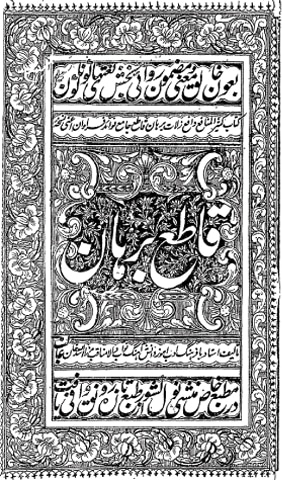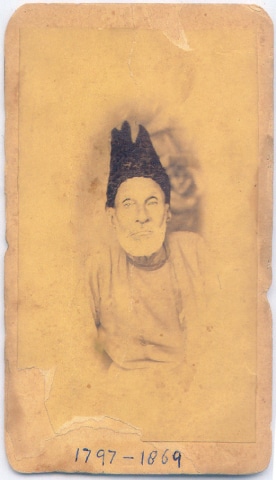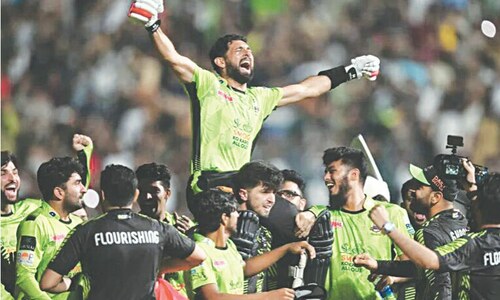
The year is 1857 and, after a long struggle with his persistent financial instability, our very own Mirza Nosha, also known as Mirza Ghalib, has established himself as a litterateur amongst Delhi’s literati.
Orphaned at a very young age and reared by one of his uncles, Ghalib had a difficult childhood. Later in his youth, he is to be obsessed with his portion of the same uncle’s pension as one of the legal heirs. The pension affair weighs heavy on his nerves and makes him travel to Calcutta. To his utter chagrin, things do not go his way. The uncle’s sons are wicked and influential enough to throw out the hapless bard who, in their view, was an inordinate claimant on their inheritance. The poor poet has to bear the brunt of it.
Since the very beginning, he carries a sense of bereavement within himself and believes that he is a burden for those on whom he depends. But he never lets his ill fate affect him adversely in any way. In Delhi, he is a man of an affable deportment, mannerly in speech. To rebuff his financial setbacks, he adopts the lifestyle of an aristocrat.
The result is more than obvious: he is in debt consistently. However, he lives quite a robust life in Delhi, while having flings with courtesans and dousing away his misery in excess of booze. He is conscious of being a sinner and knows the quantum of his sins to be limitless, as he says himself:
Ghalib is a giant in the world of Urdu literature. But he wanted to be celebrated as a poet of Persian — a status that eludes him in death, as it did in life. “Nobody enjoys the Persian odes that I pride myself on,” he once wrote in a letter. Why was he obsessed with this unrequited love for a language other than the one for which he is celebrated?

[The proclivity towards sins ought to be equated with the yearnings of the heart
Even if there be the water of seven seas, only a part of my garb will be soaked]
Ghalib is not a run-of-the-mill poet or just any other versifier in Delhi. He is an aficionado and maestro. He is too good at his art, and prosody is like child’s play for him. He asks his audience to play a round with him and flabbergasts everyone while ending up with all three aces in his hand. There is no match to him in contemporary literati.
That’s all right. The problem is that he knows the fact that he is the ace all too well. This adds to his misery as his merit is not acknowledged; rather he attracts more enemies. The best example is his rivalry with Ibrahim Zauq, the poet laureate of Delhi and the king’s tutor in poetry.
In 1852, Bahadur Shah Zafar, the king of Delhi, celebrates the wedding ceremony of his crown prince, Mirza Jawan Bakht, with great pomp and show. Ghalib is tasked by the queen, Zeenat Mahal, to write a sehra or prothalamion for the prince. The poet complies without delay. But, in his narcissist vein, he claims in one of the couplets that no other poet could write a prothalamion like him. The couplet goes:

[I understand the subtleties of art and am not Ghalib’s partisan
But let’s see if someone can write a better prothalamion than this one]
The king gets the message loud and clear, that Ghalib has taken a jibe at him for appointing Ibrahim Zauq his tutor and poet laureate instead of Ghalib. This shows the king does not know the worth of art and he is a partisan of Zauq.
The king asks Zauq to write a prothalamion promptly in response. Zauq complies, albeit his prothalamion is way inferior to Ghalib’s. With Zauq being the king’s blue-eyed boy, Ghalib has to write an apology for his tongue-in-cheek couplet. But Ghalib’s seditious spirit comes to the fore even in the apology. He claims that for centuries his ancestors were soldiers and poetry is not what he depends upon for honour and prestige.
In one of the couplets he, once again, belittles Zauq’s talent:

[I am not a poet of Urdu
I write Urdu poetry for the sake of your pleasure only]
Ghalib claims in the couplet that he makes no claim of being an Urdu poet, that he wrote the prothalamion only for the pleasure of her majesty (the queen). Here, again, Ghalib is averring himself to be a poet of Persian rather than that of Urdu. Whereas Zauq was no match to him at all in Persian poetry. He attests whatever he said afore in the apology in the last couplet as such:

[God be witness to the fact that Ghalib is truthful
I speak the truth as I am not in the habit of lying]
Despite the double meanings of the apology’s verses, prima facie the apology is meek and reconciliatory. Therefore, the king has to let the matter go. In 1854, Zauq dies and Ghalib is appointed as the king’s tutor. But, unlike Zauq, Ghalib is never to be honoured as the poet laureate.
PERSIAN, URDU AND GHALIB

Urdu poetry is one of the most difficult genres to practice, owing to its prosody. There is a common misperception that poetry is just rhymed thoughts and anyone can do it. This is hardly the case. In Urdu, the prosodists have developed certain meaningless words as measures to balance a couplet. These meaningless words are called arkaan. The repetition of these meaningless words in a certain sequence constitute a behr (metre). The words in each couplet are scanned/measured against the arkaan, so as to get one of the metres.
There are eight popular behrs in Urdu poetry; although metre can be manipulated to get some other complex metres, which are for specialists and maestros. Urdu’s prosodic base is from Persian poetry and so are its metres.
Ghalib is too well versed in Persian poetry; rather, he considers himself as one of the best poets of Persian and not of Urdu. He is not amused when the king asks him to write in Urdu for a poetry symposium to be held at the Red Fort. As he complains in one of his letters to his friend Munshi Nabi Bakhsh (Haqir):
“My friend, you praise my ghazal and I am ashamed of it. These are not ghazals, but things I write to earn my bread. Nobody enjoys the Persian odes that I pride myself on. My sole hope of appreciation now arises from his majesty, the shadow of God, issuing a command by saying, ‘My friend, it has been some time since you brought me a present’ — i.e. a new Urdu poem. So willy-nilly an occasion arises when I compose a ghazal and bring it to the court...”
The above cited letter has been quoted by Altaf Hussain Hali in his book Yadgar-i-Ghalib, and was also translated and reproduced in the book The Oxford India Ghalib by Ralph Russell.
Hali further adds, “He [Ghalib] did not look upon the ability to write Urdu poetry as an accomplishment; in fact, he thought it beneath him.”
Similarly, when the editor of a Delhi Magazine, Aaram, asks him for some Urdu ghazals, he responds as such:
“My friend, how can I write in Urdu? Is my standing so low that this should be expected of me? Still, it is expected of me. But where am I to turn, hunting for tales and stories? I haven’t a book to my name. Let my pension be restored and I’ll get the peace of mind to think of some...”
— From The Oxford India Ghalib
But when he writes Urdu poetry, or rather says it (as Urdu poetry is to be recited rather than written according to tradition), he does it splendidly. His excellence comes to the fore during poetry symposiums in the form of metrical acrobatics and the multiple meanings of his couplets.
Ghalib is not a run-of-the-mill poet or just any other versifier in Delhi. He is an aficionado and maestro. He is too good at his art, and prosody is like child’s play for him.
He is an erudite poet and has knowledge of philosophy and mysticism. He claims to be a mystic, and the themes of his poetry are testimony to the fact. He is well-acquainted with all classical Persian poets including Bedil and Huzein, and, at times, criticises them as well.

Ghalib is, in fact, not solely a poet but a philosopher poet. His couplets are loaded and expose the reader to multiple meanings. He flabbergasts his readers and audience with far-fetched metaphors, historical references and the finesse of his prosodical expertise. His audience is either awestruck or, like his archrival Ustad Zauq, is extremely envious of him.
Being a debonair past master in the art of poetry, he has many disciples (shagirds), including King Bahadur Shah Zafar himself, who come to him for correction of their verses. This happens so often that it seems that many of the king’s ghazals come directly from Ghalib’s pen. Altaf Hussain Hali, a close companion and disciple of Ghalib, quotes an incident in his book Yadgar-i-Ghalib, where the poet corrected multiple ghazals by the king in a matter of minutes and added some verses to them as well.
AGONY IN DELHI
Unfortunately, Ghalib’s excellence in the poetic arts does not pay off during his life. He is not acknowledged the way he should be. His financial constraints overwhelm him during his lifetime, save a brief interlude when he is appointed tutor to the king in 1854. But that too is short lived; in 1857, Delhi is overtaken by the East India Company and the king is promptly sent into exile to Rangoon. The poor poet is left without any hope for the future. His poetry duly reflects his plight in detail.
Ghalib’s prowess and excellence in poetry overshadows his prolificacy as a prose writer. The best amongst his prose works is Dastambu, meaning ‘posy of flowers’. Dastambu provides sufficient material to gauge the quantum of agony the poet went through. The writing is completely devoid of Ghalib’s characteristic humour. It’s an extremely sad book. In what circumstances and why this prose work was written by the ace poet is a pertinent question to be asked. For that matter, we will have to get back to 1857.
Ghalib is basking in the weak sunshine of slight monetary affluence through the stipend from the king and a meagre salary for writing the Mughal history, when catastrophe barges in, and the façade of Mughal rule in India is rendered topsy-turvy. 1857 is the year of revolt and one of the most turbulent times in Indian history. It is Ghalib’s fate to witness the massacre in the streets of Delhi and to see his city reduced to ruins in his lifetime.
There is carnage in the streets, initially by the mutineers and then by the Britishers. In any case, the loss of human lives is colossal. Ghalib is under self-imposed siege at his neighbourhood Ballimaran (not “Billimaran” or “street of cat killers”, as it was misidentified in historian William Dalrymple’s book City of Djinns). There is a situation of lockdown and curfew in the city; anyone found in the streets is liable to be killed.
Being a debonair past master in the art of poetry, he has many disciples (shagirds), including King Bahadur Shah Zafar himself, who come to him for correction of their verses.
During these ominous days, Ghalib engages himself in writing about the chaos around and resorts to his favourite medium, Persian, and not Urdu. This Persian is ornate and classical. The title, Dastambu (Posy of Flowers), is chosen not as per the book’s contents but as a literary metaphor. The book recounts 15 months of travail and agony in Delhi.

Ghalib appears to be an Anglophile when he laments the loss of British lives at the hands of mutineers, and even condemns the mutineers’ ‘act of brutality’ when they resort to killing British women and children. However, in September 1857, when the British recapture the city of Delhi, Ghalib is also courageous and bold enough to express extreme grievance over the British excesses and the atrocities committed by them.
Meanwhile, life at Ballimaran turns out to be miserable and deplorable. There seems to be no access to even basic necessities of life, including drinkable water and food. The people are constrained to live like prisoners in their own homes and have to suffice with rainwater for drinking.
Ghalib dwells in detail about the turmoils he faces those days. He adopts two children from a relative. The poet is saddened when he cannot arrange for their milk and sweets, which they desire the most. But the climax of his agony comes in the death of his brother, whose corpse remains unattended in the streets of Delhi for days.
Despite all these odds, he is a professional poet and writes a paean for Queen Victoria. He allegedly also tones down some passages in Dastambu that might cause offence to the British, in the hope of saving his skin from British vengeance and of claiming a pension for himself. But these hopes are finally dashed when his pension claim is rejected in 1859.
Whether in dejection or elation, being a poet, Ghalib resorts to his art of poetry for catharsis. He dies a decade later, in 1869. His words and legacy continue to live on.
LANGUAGES OF LOVE
The million dollar question is, why did Ghalib prefer Persian over Urdu? Was it just a subconscious infatuation with the language or was he doing it consciously? To answer the question, we will have to revisit the cultural and linguistic ethos of Mughal society.
Persian was the official language during the Delhi Sultanate era. When the Mughals took over, they kept Persian as their official language. Persian was not the Mughal’s language; their mother tongue was Turkic and Tuzk-i-Babri was written in the same language.
Unfortunately, Ghalib’s excellence in the poetic arts does not pay off during his life. He is not acknowledged the way he should be. His financial constraints overwhelm him during his lifetime, save a brief interlude when he is appointed tutor to the king in 1854. But that too is short lived; in 1857, Delhi is overtaken by the East India Company and the king is promptly sent into exile to Rangoon. The poor poet is left without any hope for the future. His poetry duly reflects his plight in detail.
With the passage of time, the Mughals let go of Turkic and started adopting more Persian in their daily routine. However, a major breakthrough for Persian in the Subcontinent came with Akbar. Being a proficient administrator, he focussed on revenue records in the country, and made it obligatory that all records be kept in Persian. It became necessary for all the educated lot to know Persian and, thus, Persian came into operations of the state full throttle.
At the same time, there were literary endeavours by the poets of the court in Persian. It’s interesting to note that native Persian speakers would snigger over Indian poets’ overtures in Persian, the way the British mocked Indians speaking their language in the later part of the 19th century.
Meanwhile, the Indian Subcontinent witnessed a rare linguistic phenomenon when Urdu emerged as the common language of people. Initially, Urdu was the pidgin language of the military camps, but soon it gained its distinct character and overwhelmed the Indian linguistic scene.
It had the Persian script, Hindi syntax and Persian-Arabic vocabulary. The royal harem adopted Urdu as their language for common parlance and, gradually, Persian was replaced by Urdu. However, it took time for sophisticated Urdu literature to come up.
It was not until the mid-18th century — during the reign of Muhammad Shah, the great grandson of Aurangzeb — that Urdu poetry was accorded recognition at the Mughal court. Till Aurangzeb’s time, Persian was in full vogue and his own epigrammatic prophecy in Persian, about the future of India, held water. As he said, “Az ma est fasaad baqi [After me chaos].”

Persian, being the language of the elite and the royal court, always had an upper hand over Urdu. That’s why the literati preferred to master the language to show their prowess and eruditeness. It was a sine qua non for the literati of the period. This may explain Ghalib’s obsession with the language.
However, his own etched belief, that he was an adept Persian poet rather than an Urdu one, turned out to be his fatal misperception. In fact, Persian was not his mother tongue but a foreign language. Despite his avid interest in the vocabulary and prosody of Persian, Ghalib’s Persian never reached the level of a maestro. His Persian was, more or less, stylised Indian Persian.
This statement can cause ripples and stirs amongst Ghalib’s admirers but truth needs to be acknowledged. The vocabulary he used in his Persian poetry was more of Urdu than Persian. The vocabulary of native speakers of Persian was markedly different .
Whatever Ghalib is today is solely due to his Urdu poetry. Ghalib’s stature as a poet is neither due to his Persian prose nor poetry. While he kept on perfecting his art and became more mature in the later stages of his poetic evolution, he is at his best when he renders poetry in an explicitly simple and meaningful verse known as Sehl-e-Mumtana.
This Urdu literary terminology literally means unattainably simple. The extreme simplicity of the verse strikes the reader/listener at once, so much so that he feels that he can also compose such a verse with ease. Of course, when he actually attempts it, he finds himself at a total loss. Allow me to explain this with certain verses of Ghalib:

[O my naive heart, what has gone wrong with you?
What can be the cure for this ache?]
Similarly:

[I invite her but, my dear heart,
May something happen to her that she just can’t help coming to me]
Now, both of the above are proper prosodic metres of Urdu poetry, namely behr-i-khafeef and behr-i-ramal. At the same time, however, the verses are profound and nuanced. The listener can objectively correlate with the emotions and feelings for catharsis.
This is the real Ghalib — the Ghalib who is a maestro and doyen of Urdu poetry, who can come up with his own mark in poetry. He has his own identity and is a beacon for the progeny to follow. He would employ florid vocabulary with explicit ease, and prosody was a piece of cake for him. There can be no one like Ghalib in the annals of Urdu poetry. He is a milestone and trendsetter, at times inimitable due to his excellence in his art.
Maybe if he had written Dastambu, his prose work, in Urdu instead of Persian, its impact would have been formidable, and the recognition for the work everlasting. Apart from its literary merit, it would have been a perfect material for a historian to explore the ravages of the 1857 uprising, like Zahir Dehlvi’s Dastaan-i-Ghadar. In Persian it was not accorded the status it deserved, as it was a foreign language for the people of the Subcontinent, and the native speakers of Persian were not interested in Indian history.
Ghalib was a literary genius. Yet, he failed to gauge the impact of Urdu in the future and recognise the overwhelming influence the language would have in times to come. There are about 170 million speakers of the language presently; it is spoken and understood in the Subcontinent and in South Asian diasporas around the globe. Ghalib’s Diwan consists of no more than 215 ghazals. Yet, it is the most applauded and debated book of Urdu poetry. No other Urdu poet could get that stature and, without Ghalib, no one can claim to know the ABCs of Urdu poetry.
Ironically, the poet himself couldn’t take pride in his magnum opus, as he used to flaunt his skills as a poet of Persian in the faces of his opponents. Ghalib is to Urdu what Shakespeare is to English. His insistence on being a better poet at Persian rather than Urdu seems like much ado about nothing.
The author was lecturer of English literature at Peshawar University prior to joining the Civil Services of Pakistan
Published in Dawn, EOS, May 16th, 2021

















































